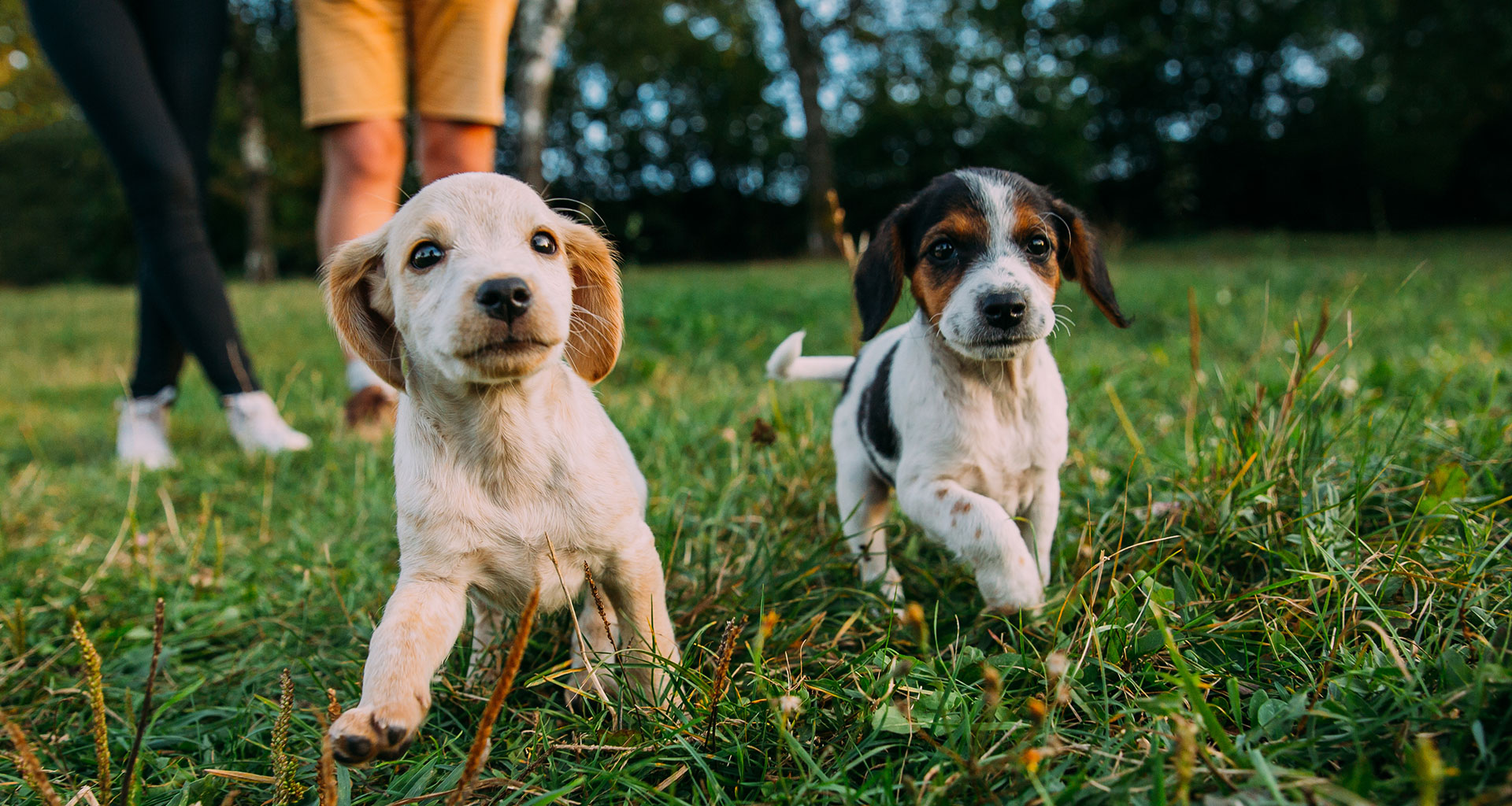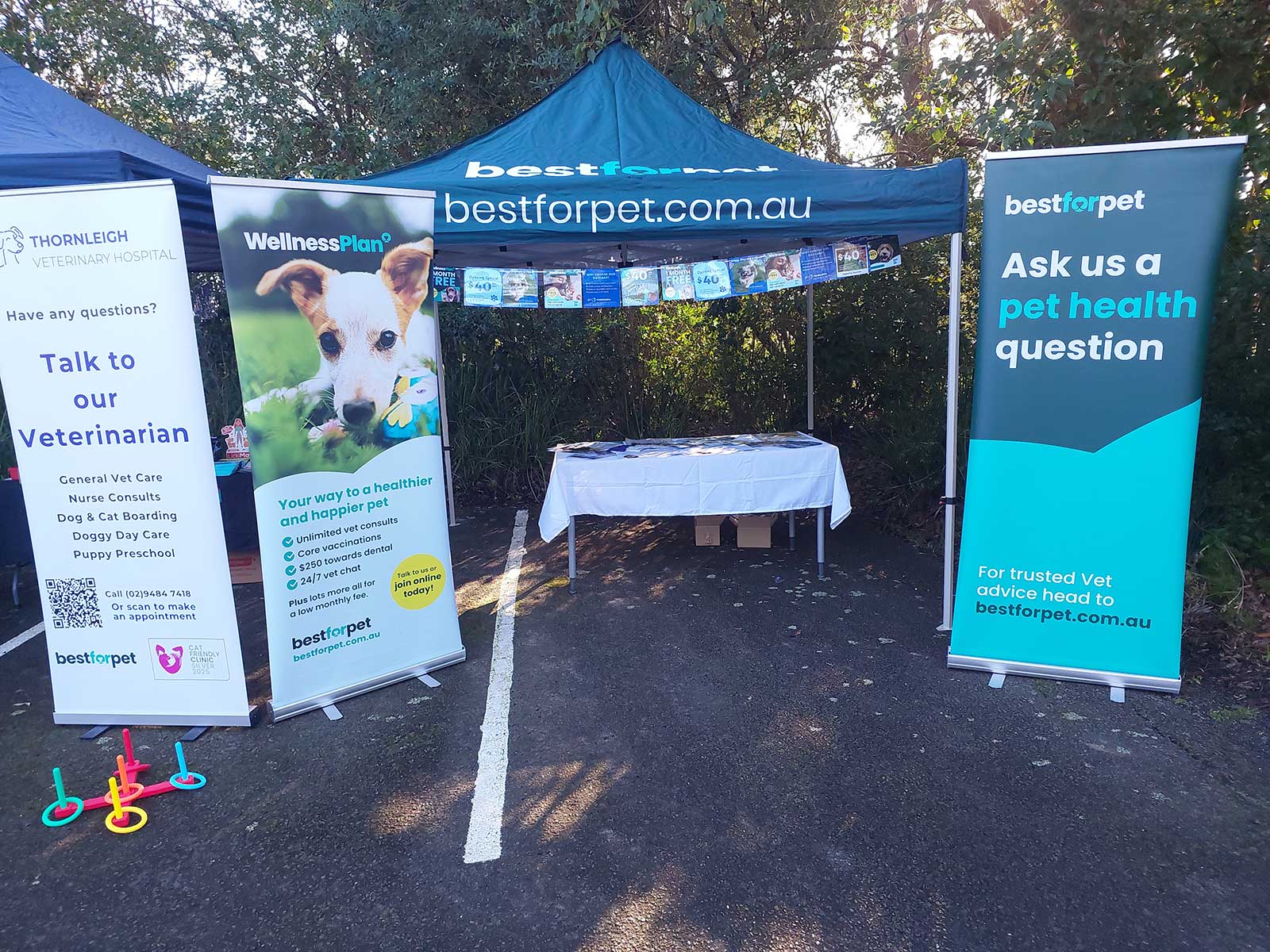Congratulations on the arrival of your new family member! We’ve put together some basic puppy information to help you get started.
Vaccination
To safeguard your pet from potentially serious and sometimes fatal diseases your puppy needs to be vaccinated. Our vaccines protect against several diseases including Canine Parvovirus, Canine Distemper, Canine Hepatitis and Canine Parainfluenza Virus and Bordetella (Kennel Cough). We recommend the following vaccination schedule:
Puppies – Vaccination every 4 weeks from 6 weeks old (or first presentation) until at least 16 weeks. In most cases this means:
8 weeks = First puppy vaccination (C3)
12 weeks = Second puppy vaccination (C5)
16 weeks = Third puppy vaccination (C5)
Then annually a Kennel Cough Vaccination (Parainfluenza Virus and Bordatella Bronchiseptica)
Triannually a C3 Vaccination (Distemper, Parvovirus and Hepatitis).
Recently we have also started recommending an annual Leptospirosis booster due to the reported cases in Sydney over the last 12 months.
When can I started taking my puppy out?
Puppies are not completely protected by their vaccinations until 2 weeks after their final puppy booster. Until this time we do not recommend you take your puppy anywhere it could be exposed to potentially life threatening diseases e.g. dog parks or areas with unknown dogs.
However the ages 8-14 weeks old is a crucial social development periods for puppies so for this reason we do recommend commencing basic socialisation. Here are some simple guidelines:
Before 10 weeks old: Out and about but in arms. No interaction with other dogs outside the household. Limited exposure.
Two weeks after first vaccination: Commence puppy preschool
Commence interaction with other friendly dogs you know are healthy and fully vaccinated.
Two weeks after second vaccination: Commence walks around the block. Avoid dog faeces and other dogs.
Two weeks after final vaccination: Fully immunised – go for it!
Handling & Stress.
Vets have to poke and prod every part of the animal so it really helps us if you get your puppy used to this at an early age. Practice touching their ears, eyes, paws and letting you open their mouths and touch around their tail base. Give them lots of rewards if they respond to this calmly. This will make future vet visits and procedures such as giving tablets or cutting nails so much easier!
Adaptil Junior collars are an effective solution to comfort newly adopted puppies and facilitate their learning. Application of the collar (which lasts a month) helps prevent crying at night and reduces stress or fear associated with being alone, loud noises or car travel. It also promotes better socialisation with other puppies and people. We recommended all new puppies wear this collar for their first month (and potentially ongoing). Please speak to our staff for more details.
Intestinal Worming
The most common worms that affect dogs in Australia are roundworm, hookworm, tapeworm and whipworm. Worms are a common cause of ill health in pets and can cause problems such as loss of appetite, vomiting, diarrhoea and in severe cases, death. Puppies should be wormed:
- Fortnightly worming from 2 weeks old to 3 months old
- Monthly worming from 3 months old to 6 months old
- Three monthly worming from 6 months old for life.
Heartworm Prevention
Heartworm disease is a very different kind of worm that is spread by mosquitoes and causes serious damage to the heart of infected dogs. Heartworm is best prevented by an annual injection to ensure constant coverage as a gap in treatment can lead to serious complications.
Ticks & Fleas
Fleas are a constant cause of discomfort and skin disease for dogs and are much easier to prevent rather than treat. Coastal NSW is also home to the deadly Paralysis tick. They are carried by wildlife and are rapidly life threatening. Please note we have high numbers of paralysis ticks in our area and for this reason recommend year-round protection. Our recommendation is Bravecto chew every 3 months to align with the intestinal wormer or Bravecto spot-on every 6 months.

Desexing
We strongly recommend all puppies are desexed. Desexing prevents unwanted pregnancies, reduces dog-to-dog aggression, roaming and territory marking in males and in both sexes eliminates the risk of common hormone-associated tumours late in life. The puppy is in for the day (doesn’t stay overnight) and a straightforward surgery is performed. Risks of complications or death are incredibly low (less than 0.5%) but may include bleeding or unexplained anaesthetic drug reactions. Please discuss any concerns you may have with staff.
Breed, sex and temperament play an important role in determining what age to desex as well as an owner’s financial limitations and these factors should be discussed with your vet to come up with an appropriate desexing age specific to your dog. For more information on when to desex dogs check out this article. Please note that as of July 2020, NSW Pet registration fees are increased for any dog registered whilst not desexed over the age of 6 months old so be aware you may be required to pay a higher registration fee if you choose to desex them later.
Identification and Microchipping
Legally all pets must be microchipped by 3 months old and registered with the council by 6 months of age. Most puppies will be microchipped by the breeder or initial owner however this can be performed at the time of desex if need be.
Puppy school
We strongly recommend puppy preschool to teach your puppy life skills and how best to interact with human and doggy friends. Our classes are run by Carolina at the hospital. Please call her direct on 0414 655 479 to book or ask at reception for a brochure.
Food
Food is CRITICAL in ensuring your puppy grows well and in a healthy manner. Dogs are omnivores which means they require meat as well as plant based foods. The easiest way to provide your puppy with a balanced diet is to feed them a commercial food.
- Supermarket foods – these are very poorly regulated, bulked out with additives that aren’t good for your pup (such as poor quality grains, meat off cuts and salt). This is the equivalent of us eating Macdonalds every day!
- Premium foods – these are usually purchased at places like petbarn. Some premium foods are excellent however even this market is poorly regulated and many brands do not provide an adequate balance.
- Super premium foods – these include Royal Canin or Hills. These companies spend millions of dollars on research to ensure their foods are balanced, palatable and improve lifespan.
Thornleigh Vet hospital recommends Hill’s Science Diet puppy foods. Please ensure larger breeder puppies are fed a “large breed” diet to ensure their calcium levels are appropriate.
Please ask our staff if you have any questions about food, bones or treats.
Pet Insurance
We strongly encourage pet insurance for your puppy. It is a good idea to get started when your puppy is young before any accidents or other mishaps occur. There are several policies available to suit your budget and desired level of cover. If you are interested our staff can organise a referral to Knose Pet Insurance for a no-obligation quote.
Careful I’m toxic!
There are quite a few dangerous substances that your new furry family member will need to avoid. These can cause internal disease and if serious, may be lethal. If consumed, please do not hesitate to give us a call.
- Mouldy foods
- Chocolate
- Onions
- Garlic
- Macadamia Nuts
- Avocado
- Grapes and raisins
- Xylitol (Sugar alternative in sugar-free candies, gums, baked goods, etc.)
- Human medications
- Raw dough (e.g. pizza dough)
- Fatty foods (e.g. ham or sausages)
- Recreational drugs
- Cooked bones
- Rat & Snail baits
- Fertilisers e.g. blood & bone.


